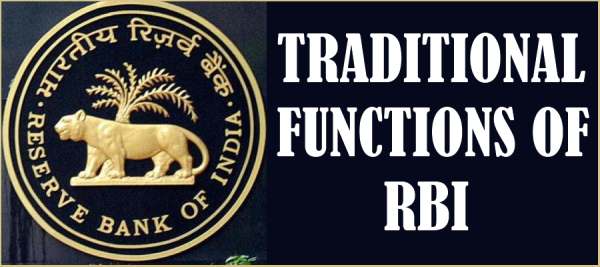Traditional Functions of Reserve Bank of India
The traditional functions of Reserve Bank of India includes Issue of Currency, Banker to Govt, Bankers Bank, Credit control Measures, lender of lost resort, exchange control, clearing house etc.

Traditional Functions of Reserve Bank of India
1. Issue of Currency: RBI undertakes issue of currency and the system adopted in India is the minimum reserve system. All the currency notes from Rs. 2, Rs 5, Rs. 10, Rs. 50, Rs. 100, Rs. 500 and Rs. 1,000 are issued by RBI and they carry the signature of Reserve Bank of India Governor. They are called unlimited legal tender and any amount of payment can be made with these currencies subject to the regulations of Income Tax Act, 1961.
The one rupee note and smaller coins are issued by the government and they are called limited legal tender which means that they can be demanded as a medium of payment only to a limited extent. The one rupee note carries the signature of secretary to the Ministry of Finance.
2. Banker to Government: Reserve Bank of India acts as a banker to the government by maintaining the account of Central government and also that of the State government. It also provides overdraft facility to both State and Central governments. The public borrowings of government are done through Reserve Bank of India. Payments to the government such as income tax is also accepted by Reserve Bank of India.
3. Bankers’ Bank: The other traditional functions of RBI consisting of bankers’ bank is done in the following manner:
- Issuing license to banks and allowing them to open branches under the provisions of Banking Regulation Act.
- RBI also controls the working of commercial banks and undertakes periodical inspection of these banks.
- In case of violation of the Banking Regulation Act by any of the commercial banks, RBI will order for the closure of these banks.
- The management of the commercial banks will also be controlled by Reserve Bank of India. All the top level management appointments of commercial banks require prior approval of RBI.
- The credit requirements of commercial banks are met by discounting and re-discounting eligible securities at the bank rate.
4. Credit Control functions: RBI exercise the following credit control measures
- The quantitative weapons of bank rate, open market operation and variable reserve ratio are exercised by Reserve Bank of India.
- The modern weapon of selective credit control is also being exercised by RBI particularly on agricultural commodities.
- The seasonal fluctuations in the money market is balanced by Reserve Bank of India through adequate finance during a period of financial stringency.
5. RBI acts as lender of last resort: The commercial banks have to maintain as a part of statutory requirements certain percentage of their deposits with RBI which is called cash reserve ratio.
By increasing or decreasing this percentage of cash reserve ratio, RBI allows adequate funds for lending purpose by commercial banks. When all the commercial banks are depositing with Reserve Bank of India in the form of cash reserve ratio, a sizable amount of fund is available with RBI. This fund will be extended by RBI to any commercial bank which is facing crisis.
6. Exchange control function: In India, we have the exchange control since independence and RBI is given enough powers to exercise exchange control. Without the license of Reserve Bank of India no one can deal in foreign exchange. The exchange rate with different foreign currencies is provided by RBI to its authorized dealers consisting of nationalized and other private commercial banks.
All the foreign exchange earnings in the country are kept by RBI in the form of foreign exchange reserve. RBI also has the responsibility of maintaining the value of domestic currency and take adequate measures so that its value does not depreciate abnormally in relation to foreign currencies.
7. Clearing house: In all big cities Reserve Bank of India has its branches and clearing house operations are undertaken. Where RBI does not have its branch, the clearing house operations are undertaken by State Bank of India and its subsidiary banks. All the commercial banks in India are members in clearing house and they take part in the clearing of cheques.


